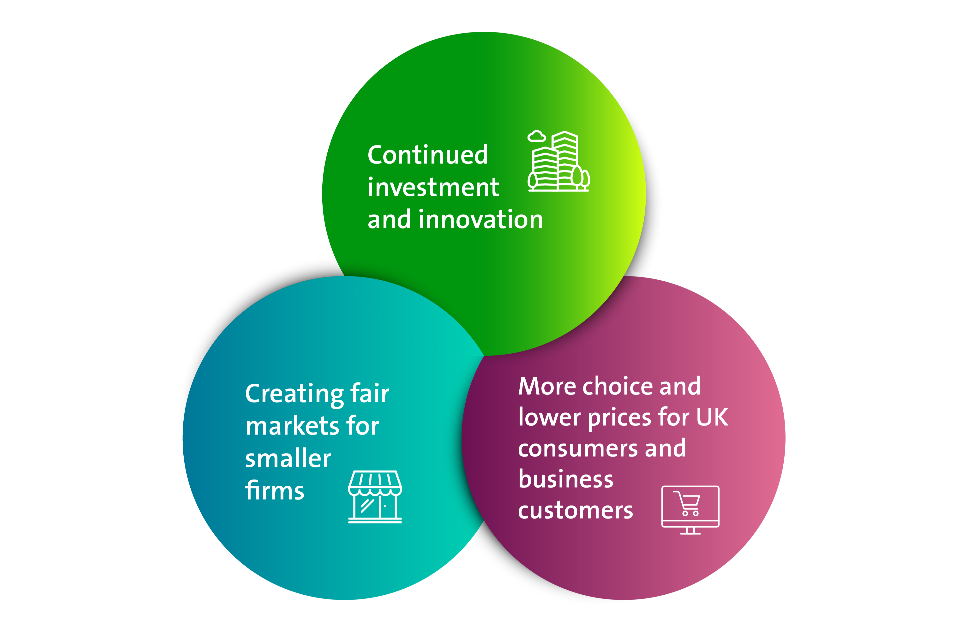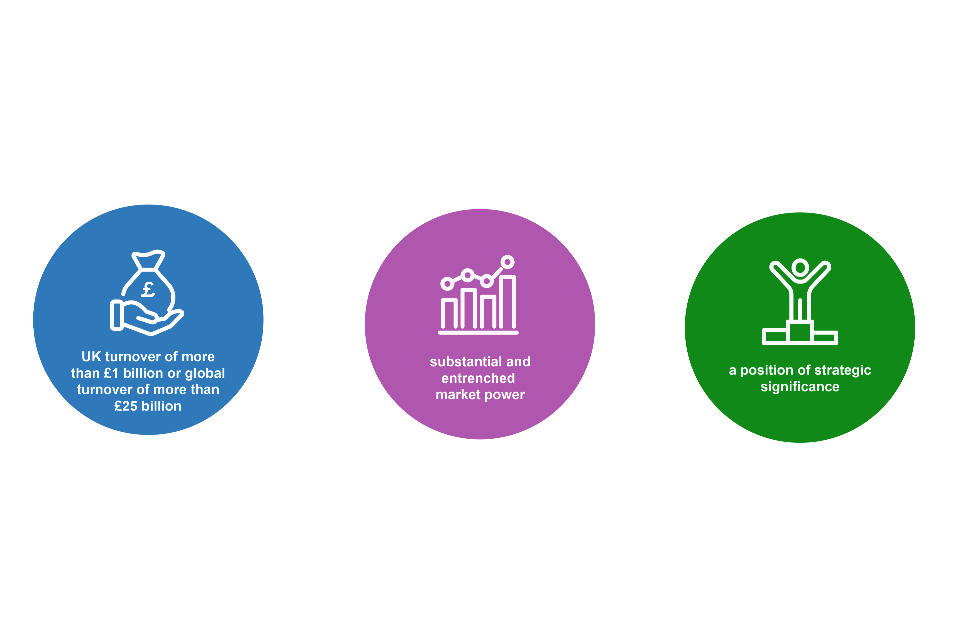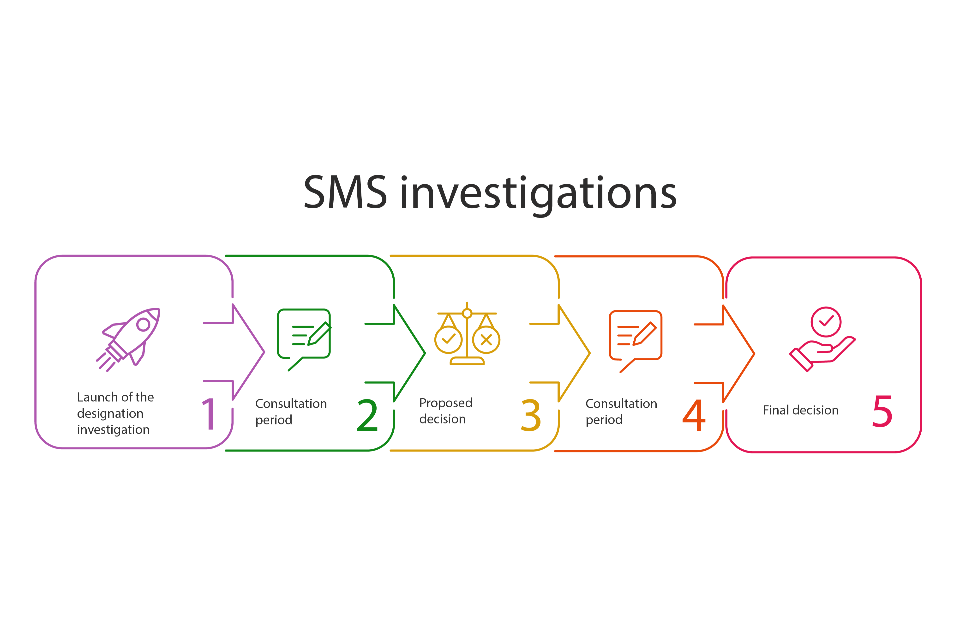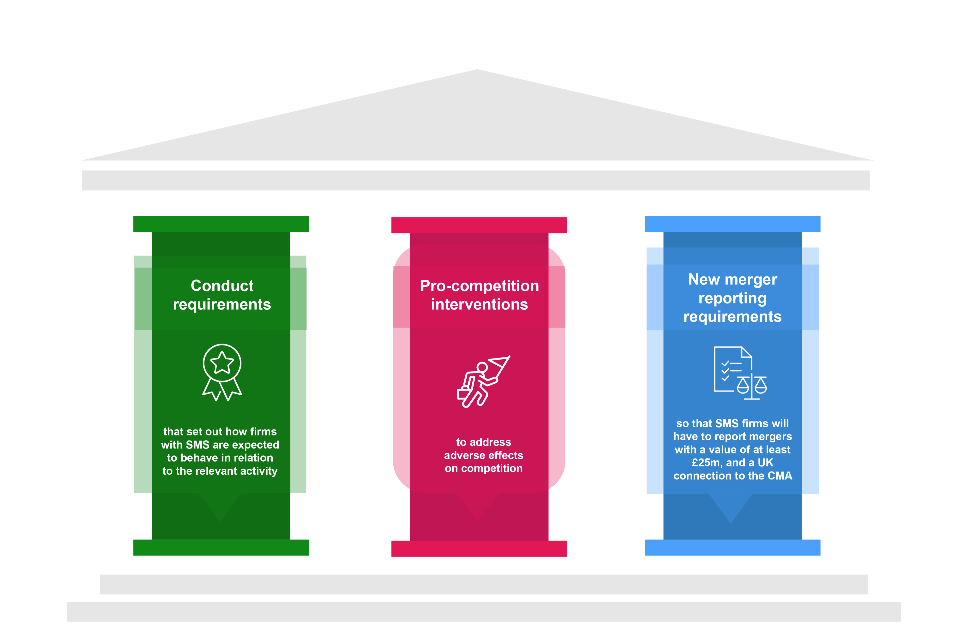How the UK’s digital markets competition regime works
How the digital markets competition regime will promote competition in digital markets.
The digital markets competition regime
From January 2025, new responsibilities for the CMA came into force under the Digital Markets, Competition and Consumers Act 2024.
The digital markets competition regime enables the CMA to promote competition in fast-moving digital markets, while protecting UK consumers and businesses from unfair or harmful practices by the very largest technology firms.
The regime will unlock opportunities for more innovation and economic growth across the UK tech sector, benefitting companies of all shapes and sizes – along with the investors who back them. It will also help people and businesses across the UK, who rely on access to critical digital markets, to get a fair deal.
Will Hayter on the UK’s new digital markets competition regime
On 14 January 2025, the CMA launched the first investigation under the regime, focused on Google’s activities in search and search advertising.
On 22 January 2025, the CMA announced that it would also investigate Apple and Google’s position regarding their mobile platforms, which includes operating systems, app stores and browsers that operate on mobile devices.
More information is available on each of the investigation pages:
-
SMS investigation into Google in relation to general search and search advertising
- SMS investigation into Apple’s mobile platform
- SMS investigation into Google’s mobile platform
Benefits of the regime for the UK
The regime provides a unique opportunity to encourage the benefits of investment and innovation from the largest digital firms, while ensuring a level playing-field for the many start-ups and scale-ups across the UK tech sector. The multitude of UK businesses and consumers who depend on the largest firms for critical products and services will also benefit from more innovation, more choice and more competitive prices.

- opportunities to harness the benefits of continued investment and innovation by the very largest firms
- unlocking expanded opportunities for investment and innovation by creating a level playing field for start-ups and scale-ups (many UK-based) to succeed
- strengthened opportunities for UK consumers and business customers, those who rely on key platform services, to benefit from greater choice, more innovation and lower prices

People can:
- make informed choices, with defaults and choice architecture aiding decision-making
- use the products and services that best meet their needs, regardless of what other products and services they use and who they are provided by
- easily switch providers, without losing access to their data and content
- be protected from exploitation and unfair or misleading practices

To ensure that businesses:
- that rely on Strategic Market Status (SMS) firms do not face exploitation or anti-competitive behaviour by those firms
- have a fair chance to compete with SMS firms, including through appropriate access to data and functionality

Driving economic growth and improved productivity by:
- harnessing the benefits of continued investment and innovation by the very largest firms
- expanding opportunities for investment and innovation by creating a level playing field for start-ups and scale-ups (many UK-based) to succeed
Criteria for Strategic Market Status
The heart of the regime is proportionality. It is designed to apply only to the very largest firms. If certain conditions are met, these firms can be designated with Strategic Market Status (SMS) in relation to a particular digital activity.
Will Hayter on Strategic Market Status
In the first investigation under the regime, the CMA will consider whether Google, which accounts for more than 90% of all general search queries in the UK, has SMS in the provision of search and search advertising services.
The second area of focus for the CMA relates to two further investigations – one into Apple and another into Google – to assess whether these firms have SMS in their respective mobile platforms which include the operating systems, app stores and browsers that operate on mobile devices.
The CMA will carry out investigations within a 9 month statutory timeframe to consider whether to designate a firm with SMS.
To assess whether the conditions for an SMS designation are met, the CMA will carry out evidence-based investigations, consulting and engaging with a wide range of stakeholders.
The conditions are:

- UK turnover of more than £1 billion or global turnover of more than £25 billion
- substantial and entrenched market power in relation to the digital activity
- a position of strategic significance
The CMA must carry out a forward-looking, five-year assessment to decide whether a firm has ‘substantial and entrenched’ market power in a particular digital activity. To make sure the regime keeps up with developments in fast-moving digital markets, SMS designations are time-bound for review every 5 years.
A firm has a position of strategic significance if it has at least 1 of the following:
- significant size or scale in the digital activity
- a significant number of other firms use the digital activity to carry out business it can extend its market power to a range of other activities
- it can substantially influence how other firms behave, in respect of the digital activity or otherwise
Stages of an SMS investigation
An SMS investigation will usually last 9 months. The stages are:

- launch of the designation investigation
- consultation period
- proposed decision
- consultation period
- final decision
At least 9 months before the end of the five-year designation period, the CMA must open a new SMS investigation to re-assess the firm’s status.
Conduct requirements and pro-competition interventions
If the CMA designates a firm with SMS, it will have 2 key tools: Conduct Requirements and Pro-Competition Interventions.
Through Conduct Requirements, the CMA will be able to guide the behaviour of SMS firms, tackling conduct that could undermine fair competition, or exploit people and businesses.
Through Pro-Competition Interventions, the CMA will be able to address specific competition problems arising from a firm’s market power in a particular digital activity.
The regime also provides for additional merger reporting requirements on SMS firms, to make sure the CMA has earlier sight of mergers and acquisitions that could harm competition in digital markets.

Conduct requirements
The CMA may put in place one or more tailored rules for SMS firms - steps that require them to take certain action or to stop a specific activity. These requirements may be put in place where doing so would be proportionate to achieve specific positive outcomes for users (or potential users) of the digital activity. These are fair dealing, open choices, or trust and transparency.
Pro-competition interventions
Once a firm has been designated with strategic market status, the CMA may investigate whether anything relating to the designated digital activity (for example, the behaviour of a firm or the structure of a sector) is harming competition.
If the CMA finds an adverse effect on competition, it can design and test interventions to address these competition problems and any harmful effects on users. This might include giving people the power to transfer their data easily between providers; or requiring firms to make sure different products and services work smoothly together (‘interoperability’), so businesses can more easily innovate and compete.
New merger reporting requirements
SMS firms must report mergers with a UK connection, and a value of £25 million or more, to the CMA before their completion. Where the CMA is concerned a merger might cause competition problems, it will launch a merger investigation under its normal merger review process.
Design and approach
The way rules are designed and applied matters if the UK is to maximise its international attractiveness to innovators and investors. The new regime has been created with this in mind, representing a unique combination of ‘best-in-class’ features, which the CMA is committed to implementing in an open, transparent, solutions-focused way.
Will Hayter on how the CMA will operate in the digital markets competition regime
Proportionality
The regime applies only to the very largest technology firms - those with substantial and entrenched market power in a particular digital activity. The CMA will also take a highly tailored, bespoke approach to identifying and addressing specific harms.
Process
The process for investigations and interventions will be participative and transparent, including constructive engagement with SMS firms and other stakeholders to resolve concerns quickly and effectively where possible.
Predictability
Interventions are developed through a forward-looking, iterative and open process, providing the predictability that is critically important to businesses. Designations are limited to a maximum of 5 years before the CMA must consider whether they should be renewed, varied or revoked. This provides certainty whilst enabling the CMA to take account of technological and broader market changes.
Pace
Designation investigations have a 9-month statutory timeline, with the CMA able to consult on conduct requirements at the same time, helping us to reach positive outcomes faster. The Digital Markets, Competition and Consumers Act also provides for a new general duty of expedition for the CMA, including in relation to the digital markets competition regime, which means pace will be a key focus.
Administering the regime
The CMA will actively monitor interventions to make sure they are effective, avoid unintended consequences, and are targeted where they can have the most positive impact.
The most significant decisions under the regime will be taken by the CMA Board and a new Digital Markets Board Committee.
The CMA will coordinate with other regulators domestically and set out arrangements for doing this in published memoranda of understanding.
Many of the issues the CMA will tackle are cross-border in nature, so it is also working closely with international partners to help shape a regulatory landscape that supports investment and innovation in the UK.
Updates to this page
-
Detail of mobile SMS investigations added.
-
Details of the first SMS investigation added.
-
First published.